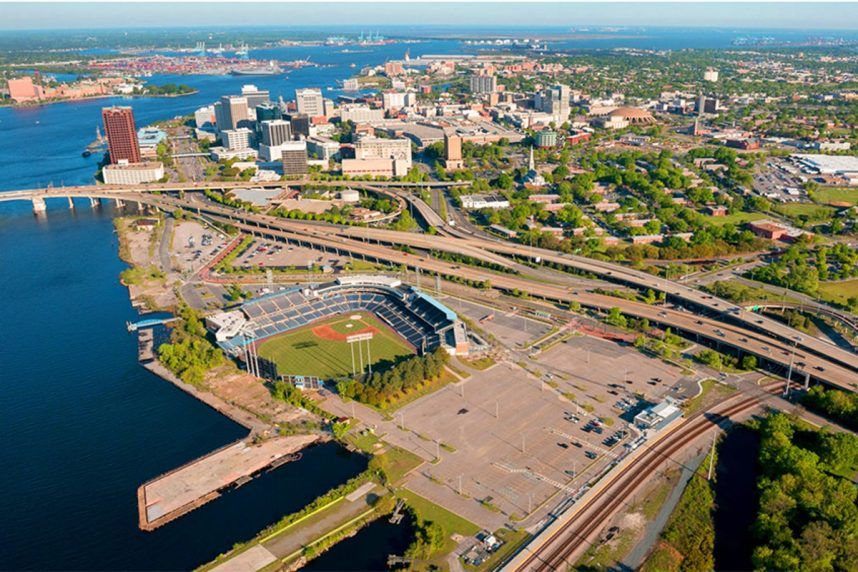Norfolk Readying to Field New Casino Bids Should HeadWaters Plan Bust
Posted on: April 5, 2024, 08:50h.
Last updated on: April 5, 2024, 08:55h.
Officials in Norfolk are preparing to field new proposals for a commercial casino resort in Virginia’s Hampton Roads should the city’s current plan with its preferred gaming partner fail to materialize.

Nearly three and a half years since Norfolk voters signed off on a proposed project called HeadWaters Resort & Casino, the ground remains unbroken on the construction site located just east of the city’s Harbor Park Minor League Baseball stadium. The developers behind the casino, the Pamunkey Indian Tribe and Golden Eagle Consulting, are still finalizing the project after the city last year rejected its proposed two-phase construction schedule.
If they don’t perform, we will have somebody take their place,” Norfolk City Attorney Bernard Pishko told The Virginian-Pilot.
The 2020 development agreement between the city and Pamunkey Tribe requires that the casino obtain a gaming license from the Virginia Lottery Board by November 2025. With that date fast approaching, the Norfolk government is prepping its next steps in case HeadWaters doesn’t finalize its plan to the city’s wishes and be deemed approved for a slot machine, table game, and sports betting license by November 2025.
Only state lawmakers can extend the November 2025 deadline. Virginia’s 2020 casino law says approved casino referendums become annulled if a gaming license hasn’t been granted to the project within five years of ratification.
Norfolk Casino Backstory
Norfolk voters in 2020 approved a proposed casino resort pitched by the Pamunkey Indian Tribe. The city was set aside a casino resort opportunity through state legislation. Norfolk was one of five cities earmarked a casino license to spur local economic development.
City officials partnered with the Pamunkeys, a federally recognized tribe with a small reservation about 65 air miles northwest of Norfolk in King William. The tribe counts less than 500 members.
Despite lacking any gaming experience, Norfolk went with the tribe to appease concerns that the Pamunkeys might open a tribal casino on their federal land that could dampen business at the city’s commercial casino and, therefore, lessen its tax benefit. A tribal casino, some theorized, would have additionally reduced nongaming project development surrounding the Norfolk casino.
The tribe partnered with billionaire Jon Yarbrough, who made his fortune by manufacturing Indian gaming machines, to bankroll the $500 million resort and retain an ownership position in the property. Though HeadWaters is a commercial endeavor, Yarbrough’s Golden Eagle Consulting had the contract terms approved by the US Department of the Interior to make sure it was fair for the tribe.
Design Headwinds
HeadWaters has incurred numerous design setbacks.
The original idea was to construct the casino along the Elizabeth River while a temporary casino inside Harbor Park helped raise revenue for the project. Those plans were canned after it was determined that Virginia’s 2020 casino bill didn’t allow casino gambling at Harbor Park, which has a different mailing address than the parking lot where Norfolk voters approved HeadWaters to be built.
The temporary casino gaming is to be conducted at the same site referenced in the referendum,” Virginia’s casino law says of temporary gaming structures. Norfolk voters approved casino gaming through the ballot question only “on property east of Harbor Park Stadium … with an approximate street address of 200 Park Avenue.”
The Pamunkeys and Golden Eagle then pitched a two-phase development, with the casino first and hotel and resort later. That concept was dismissed by city officials who said their agreement with the developers required the resort complex to be fully built at once.
The tribe went back to the drawing board, which is when Virginia allocated significant money to Norfolk for the city’s Coastal Storm Risk Management Project. The $2.6 billion infrastructure undertaking includes building a 17-foot-high floodwall along with Elizabeth.
The floodwall required that HeadWaters overhaul its design by removing the once-planned marina that would have allowed boaters to dock and visit the casino. The resort’s hotel overlooking the river was also forced to move inland.
Last Comments ( 1 )
Liberal cities, counties and states are almost impossible to get opportunities like this to the end unless lots of payoffs and promises are provided. Trying to do it like a regular project will never happen. I think MGM spent like 60 M on “lobbying” fees in Delaware, 10s of millions more spent by gaming companies in Massachusetts and who know how much more,in lobbying money has been spent on gaming opportunities throughout the country. What does lobbying look like? Pay a lobbying company a million dollars, the lobbying firm will give the politicians overseeing the gaming stuff maybe 80% of the million and will keep 20% for themselves? I don’t know the percentages, maybe the lobbying firm hires the politicians family member and pays them the 80% or so.. In the end, and in my opinion, lobbying is just another way to bribe. Let’s see how much lobbying goes into Virginia and let’s follow how much the politicians overseeing gaming bank…. And let’s see how how the lobbyist pay the tribes too..